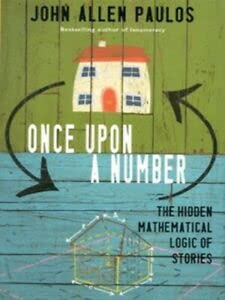Mathematician John Allen Paulos bravely bridges the scientific and literary cultures with this amusing, enlightening look at numbers and stories. If you think those two things go together like a "horse and a paperclip," as Allen wryly observes, you only have to look at phenomena like the Bible codes, the stock market's ups and downs, and the Clinton sex scandal to begin to understand the hidden bonds between them. Put simply, mathematics can describe everything that happens, and everything that happens contextualizes mathematics. In demonstrating this, Paulos continues the noble numeracy crusade he began with A Mathematician Reads the Newspaper and Innumeracy . Perhaps the most compelling thought experiments in the book are those of the statistics of stereotyping and race relations. Paulos shows, mathematically, that minority status makes achieving equality extraordinarily difficult. If you want to keep hold of your comfortable worldview, don't read Once Upon a Number . But you'll be missing out on an unforgettable reminder of what chance, coincidence, and odds really mean, along with several valuable life lessons that may help you understand lost socks, racism, and mistaken identity. --Therese Littleton
Mathematician John Allen Paulos bravely bridges the scientific and literary cultures with this amusing, enlightening look at numbers and stories. If you think those two things go together like a "horse and a paperclip," as Allen wryly observes, you only have to look at phenomena like the Bible codes, the stock market's ups and downs, and the Clinton sex scandal to begin to understand the hidden bonds between them. Put simply, mathematics can describe everything that happens, and everything that happens contextualizes mathematics. In demonstrating this, Paulos continues the noble numeracy crusade he began with
A Mathematician Reads the Newspaper and
Innumeracy. Perhaps the most compelling thought experiments in the book are those of the statistics of stereotyping and race relations. Paulos shows, mathematically, that minority status makes achieving equality extraordinarily difficult.
If you want to keep hold of your comfortable worldview, don't read Once Upon a Number. But you'll be missing out on an unforgettable reminder of what chance, coincidence, and odds really mean, along with several valuable life lessons that may help you understand lost socks, racism, and mistaken identity. --Therese Littleton
